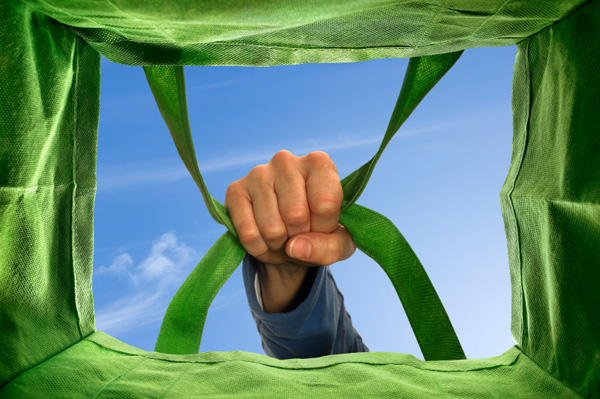So I wrote my first green blog yesterday and sent e-mails to all my friends about it! I got a few responses from people who said they already use canvas bags, but told me to keep spreading the word. I got no responses from people who decided to make a change today (although I'm hoping some did and just didn't say so!) And I got one response from my friend Trevor who told me that he didn’t understand my point, thinks the whole "going green" movement is lame and doesn’t believe in global warming.
First of all, I told him, global warming has almost nothing to do with plastic bags. Second of all, why NOT make small, green changes if they are simple ones? I mean, using canvas bags isn’t even that hard to do when you think about it. I don't know, it was really upsetting that Trevor argued with me over something I think is so logical. It also really drives me crazy that some people refuse to go green because they think it's "not cool." Oh, and somebody kicked over my snowman on purpose today too. Maybe there’s just too many people in the world who don’t care about the environment for me to actually make a difference. I don't know...
But here's some good news! I officially have two fans of my blog! Welcome Pookala and Ankerman! You two have just put me back into a good, green mood! More to come friends!
Showing posts with label plastic bags. Show all posts
Showing posts with label plastic bags. Show all posts
Saturday, January 23, 2010
Friday, January 22, 2010
A WORD ABOUT THE PLASTIC BAG
 Did you know that each American uses between 300 and 700 plastic bags per year? Most of these bags are used only one time (some of them for mere seconds!) before being thrown away.
Did you know that each American uses between 300 and 700 plastic bags per year? Most of these bags are used only one time (some of them for mere seconds!) before being thrown away.Did you know that only 1% of plastic bags in the U.S. are ever recycled?
Did you know that it takes 10-20 years for a single plastic bag to decompose? Of course, this is only if it gets caught in a tree branch or sits on your lawn all that time. Plastic bags buried in landfill can take up to 1,000 years to decompose!
Did you know that when garbage items (including paper products) are buried, their decomposition slows almost to a halt because they are not exposed to air or sunlgiht? In digs through old garbage dumps, newspapers from the 1930s have been found that are still completely legible!
If you really want to jump aboard the “green” bandwagon – you should start using canvas bags when you go shopping! Keep some in your car, your garage, your trunk, your desk, or inside your carry-all bag so you never forget to bring them with you!
Make a pledge that you will make this green change today! Don’t be embarrassed to carry reusable bags!
And the next time a cashier asks if you’d like a bag to carry that single item to your car, don’t feel weird to say, “No, thanks!” We should all start feeling weird when we waste!
Subscribe to:
Posts (Atom)
Labels
"Earth Hour"
(1)
acid rain
(1)
Amazon
(1)
animals
(1)
Arbor Day
(1)
Asia
(1)
Barack Obama
(2)
biodegradability
(1)
biodiesel
(1)
biodiversity
(1)
bioethanol
(1)
biofuels
(3)
birds
(1)
books
(1)
canvas bags
(2)
carbon dioxide
(1)
carbon emissions
(1)
carbon neutral
(1)
China
(1)
clean coal
(2)
clean energy
(2)
climate bill
(1)
climate change
(5)
CO2
(2)
coal
(1)
compost
(1)
cooking grease
(1)
corn
(1)
Crested Ibis
(1)
decompose
(1)
decomposition
(1)
Deepwater Horizon
(2)
deforestation
(2)
dinosaurs
(1)
disposable
(1)
dolphins
(1)
Earth Day
(2)
Ecuador
(1)
environment
(7)
experiment
(1)
extinction
(2)
fish
(2)
food chain
(1)
fossil fuels
(4)
freshwater
(1)
gas
(3)
global warming
(7)
go green
(1)
Great Pacific Garbage Patch
(1)
greenhouse effect
(1)
greenhouse gases
(5)
Greenpeace
(1)
groundwater
(1)
habitat
(1)
Japan
(1)
landfill
(5)
limited resource
(1)
marine life
(1)
mining
(1)
mushrooms
(1)
mycelium
(1)
natural resources
(1)
nontoxic
(1)
North Pacific Gyre
(1)
nuclear energy
(4)
oceans
(1)
oil
(6)
oil spill
(1)
organic farm
(1)
overfishing
(1)
Pacific Trash Vortex
(1)
paper
(1)
Paul Hawken
(1)
plastic
(3)
plastic bags
(2)
pollute; poetry; people; family
(1)
pollution
(4)
radioactivity
(1)
recycle
(1)
recycling
(8)
recycling symbols
(1)
reduce
(1)
renewable resources
(1)
reusable
(2)
reuse
(2)
runoff
(1)
salt
(1)
sea life
(1)
seals
(1)
sodium chloride
(1)
South America
(1)
spills
(1)
Steven Chu
(1)
Styrofoam
(2)
sugar cane
(1)
sustainability
(1)
trees
(2)
Uranium
(1)
waste
(5)
water
(5)
water conservation
(4)
water pollution
(1)
wildlife
(1)
World Wildlife Fund
(1)





